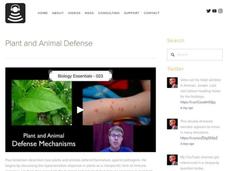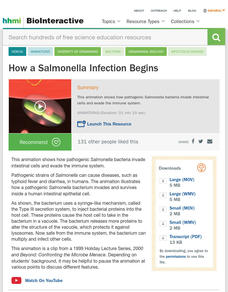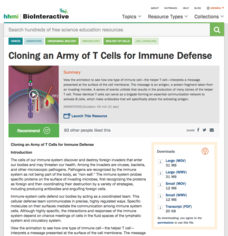TED-Ed
How Does the Immune System Work?
The human immune system doesn't always prevent us from getting sick, so what is it doing? Young scientists watch a short video explaining what the immune system is and how it works. Then, they answer eight questions to prepare for an...
Bozeman Science
Plant and Animal Defense
Explain the defense systems of both plants and animals against pathogens with a biology video. It covers the disruption of the immune system through hypersensitive responses, normal responses, nonspecific immune responses, as well as the...
Curated OER
Kids Living With Food Allergies
Food allergies can begin at a very young age. The kids in these videos talk about living with their food allergies. Some allergens include peanuts, strawberries, eggs, and shellfish. What a fantastic video to watch with your class to...
Curated OER
How A Virus Invades Your Body
This simplified explanation is an entertaining way to see how viruses reproduce in the human body. Brilliant animation and humorous commentary will keep your junior high class engaged while they observe the basics about viruses. Follow...
Nemours KidsHealth
How the Body Works: Immune Cells
Nate is learning about human body systems, and in this episode he finds out about how important the immune system is. The leucocyte army explains that bacteria, viruses, fungi, and parasites can pose a threat. The nose serves as the...
TED-Ed
Hacking Bacteria to Fight Cancer
The research being done in the field of synthetic biology holds tremendous possibilities for cancer patients. Here is a short video that details how synthetic biologists are learning how to program bacteria to attack tumors.
TED-Ed
How Do Viruses Jump from Animals to Humans?
Can humans be infected by animal viruses? Pupils explore the phenomenon of viral evolution and learn about how animal viruses sometimes adapt to infect humans. They see how viruses are transmitted and what pathogens need to survive. The...
TED-Ed
Your Body vs. Implants
Are there cyborgs amongst us? Once only found in science fiction, the proliferation of implants has surrounded us with people augmented with insulin pumps, artificial joints, and prosthetic limbs. There is a catch, however. An engaging...
Howard Hughes Medical Institute
Intracellular Infection by Salmonella
Bacteria are pesky little organisms that can often easily infect us. But how? Salmonella bacteria literally gets under our skin. Viewers see how the dangerous bacteria protects itself from defense mechanisms inside the cell.
TED-Ed
Why Is Meningitis so Dangerous?
Meningitis is scary and life-threatening—but preventable. Learn the science behind the disease and how to prevent contraction in a three-part lesson. Scholars first view a video describing the characteristics of meningitis and how people...
Howard Hughes Medical Institute
Cloning an Army of T Cells for Immune Defense
How do bodies fight infections and illnesses? An animation of the way T cells clone to fight an infection provides many details. The resource also provides an excellent written introduction and ideas for how to ensure pupils understand...
Howard Hughes Medical Institute
Dengue Virus Enters a Cell
Doctors offer limited treatment options and no vaccine for Dengue Virus, which often requires intensive care. Scientists understand how the virus gets into cells and replicates, knowledge which they hope will lead to a cure or treatment....
Be Smart
Could You Be Immune to Everything?
Could super immunity be the next big super power? Discover the amazing inner workings of the immune system through an engaging video from an interesting science playlist. Animated antibodies take on a variety of pathogenic invaders while...
TED-Ed
Why Do You Need to Get a Flu Shot Every Year?
Don't let your classes take a shot in the dark! Help them understand different types of vaccinations with an informative video lesson. The narrator explains how the flu virus challenges vaccine creators each year thanks to its...
American Chemical Society
Why Too Much Stress Is Bad For You
Papers to grade, parents to call, meetings to attend ... there seems to be no end to stress! What happens to our bodies if we are under too much stress for too long? Examine the facts through an insightful video from the American...
American Chemical Society
Why Do We Get Allergies?
Allergies are really just mistakes our immune system makes—and we pay the itchy, watery price! An ACS Reactions lesson outlines the immune response to pollens and other allergens. When the body mistakes these allergens for germs, it...
American Chemical Society
What's the Deal with Acne?
Use science to treat acne outbreaks! Scholars learn the immune response that creates their dreaded pimples. An ACS Reactions video lesson explains how bacteria and white blood cells interact to create these blemishes and how hormones...
American Chemical Society
What Is Your Snot Saying?
All mucus is not created equal! An ACS Reactions video lesson explains what the color and texture of mucus communicates. Its appearance can indicate the status of our immune systems as it contains important cells and chemical compounds...
Kurzgesagt – In a Nutshell
The Immune System Explained I—Bacteria Infection
You are under attack! Every second of your life bacteria, viruses, and more attempt to enter your body. The video explains your immune system and the extremes your body goes through to keep you alive.
Kurzgesagt – In a Nutshell
The Antibiotic Apocalypse Explained
Antibiotic resistance encompasses one of the world's most pressing public health problems. The video explains how antibiotics work and why humans are becoming resistant to them. It expands on the idea of antibiotic resistance and options...
Kurzgesagt – In a Nutshell
The Ebola Virus Explained—How Your Body Fights For Survival
Most realize that Ebola is deadly and highly contagious, but what exactly does it do to your body? The video offers a look at how Ebola spreads through your body systems. It includes how each part of the immune system responds.
MinuteEarth
Should We Grow Human Organs In Pigs?
How can pigs save lives? Examine the possibility of growing human organs from stem cells introduced into pig embryos. Learners discover the similarities and differences between pig and human organs, how stem cells function to create...
MinuteEarth
How Your Dog Can Protect You Before You're Born
Are there things mothers can do to prevent their unborn children from having asthma? It turns out the answer is related to the household pets. The video explains how dogs and cats seem to protect the health of babies and children. It...
TED-Ed
How The Food You Eat Affects Your Gut
Some foods we eat are not meant to be broken down by our digestive systems, but instead by our gut. But how can we control what our gut breaks down? The answer is simple: our diet.























